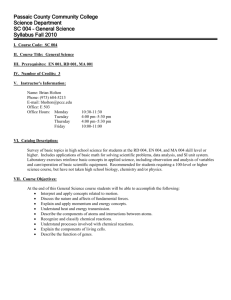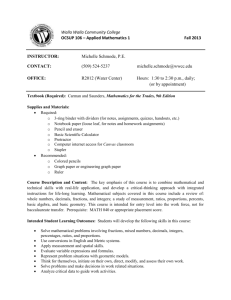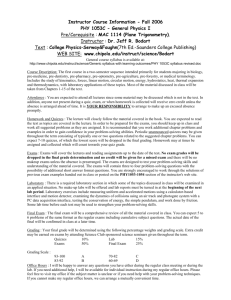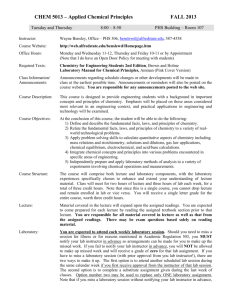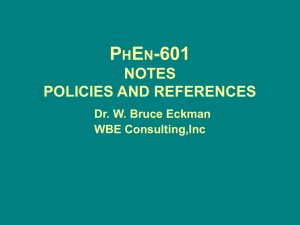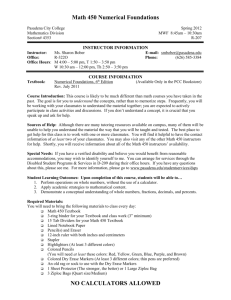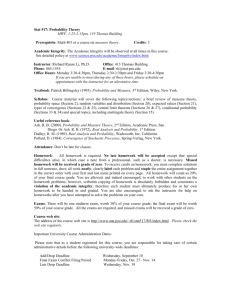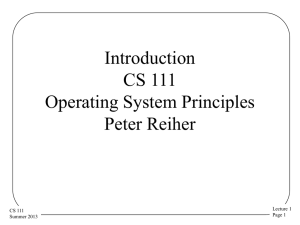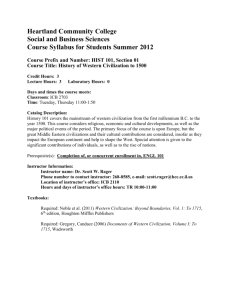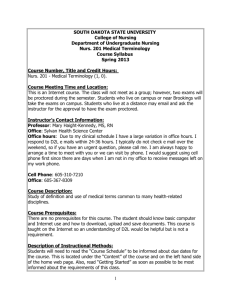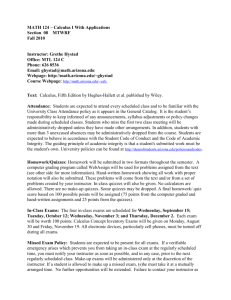PHYS 215: Engineering Physics I - Nmsu
advertisement
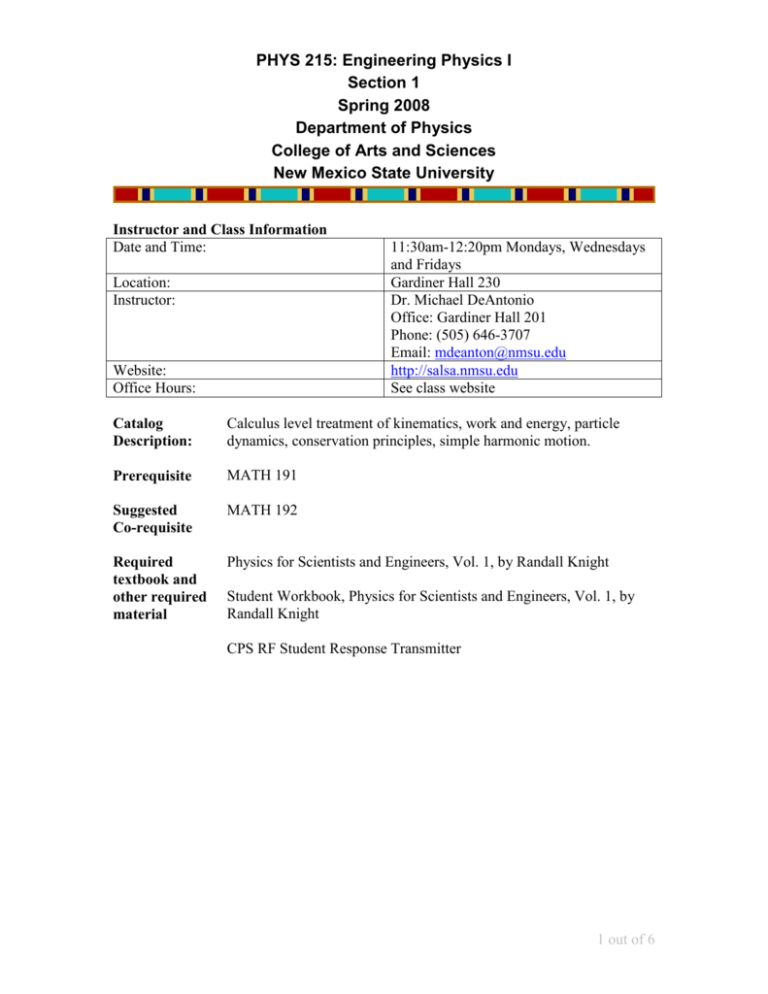
PHYS 215: Engineering Physics I Section 1 Spring 2008 Department of Physics College of Arts and Sciences New Mexico State University Instructor and Class Information Date and Time: Location: Instructor: Website: Office Hours: 11:30am-12:20pm Mondays, Wednesdays and Fridays Gardiner Hall 230 Dr. Michael DeAntonio Office: Gardiner Hall 201 Phone: (505) 646-3707 Email: mdeanton@nmsu.edu http://salsa.nmsu.edu See class website Catalog Description: Calculus level treatment of kinematics, work and energy, particle dynamics, conservation principles, simple harmonic motion. Prerequisite MATH 191 Suggested Co-requisite MATH 192 Required textbook and other required material Physics for Scientists and Engineers, Vol. 1, by Randall Knight Student Workbook, Physics for Scientists and Engineers, Vol. 1, by Randall Knight CPS RF Student Response Transmitter 1 out of 6 Course Objectives The main aim of the course is that the student will become familiar with the concepts and methods used to find a workable description of the physical world. Understanding of the concepts is stressed more than the memorization of mathematical formulas, and the meaning behind the formulas is explained. The students are expected to develop skills and to acquire knowledge to approach typical problems that are found in many engineering and scientific applications. We will cover the main principles of mechanics and oscillations and show how these principles can be applied to solve problems. Skills Covered Skill 1: Building Models Skill 2: Using Vectors and Coordinate Systems Skill 3: Problem Solving Skill 4: Systems of Measurement Skill 5: Using Free-Body Diagrams Skill 6: Using the Idea of Conservation Skill 7: Using Impulse-Momentum Diagrams and Equations Skill 8: Using Work-Energy Diagrams and Equations Skill 9: Determining Rotation from Translational Equations Skill 10: Connecting Rotation and Oscillation Topics covered Topic 1: Mathematics Topic 2: Kinematics Topic 2: Force Topic 3: Work/Energy Topic 4: Impulse/Momentum Topic 5: Systems Topic 6: Rotation Topic 7: Oscillation Grades The following system determines the total numerical and letter grade. The students will determine the blank percentages after the first week of class. Preassignments Homework Quizzes Exams Final Exam TOTAL *A+ A B C D F = = = = = = 5% 5% 10% 30% ea. (total 60%) 30% 110 % 100-110 90-100 80-89 70-79 60-69 0-59 2 out of 6 All class final grades will be rounded to the nearest integer. (e.g. 79.5 = 80 = B and 79.4999999999... = 79 = C) Preassignments: There will typically be one preassignment for each class period. These will be due before the beginning of the class period. Preassignments will be completed on WebAssign. Students are allowed to get outside help (study groups, tutors, etc.) to complete the preassignments; however, they are encouraged to do the work on their own. Each assignment will be graded out of 100%. Assignment grades will be averaged and this average grade will be worth 5% of the final class grade. Homework: There will typically be at one homework assignment for each topic. The due dates will be decided at the time the homework is posted. Homework will be completed on WebAssign. Assignment grades will be averaged and this average grade will be worth 5% of the final class grade. Quizzes: There will be a quiz during one or more class period(s) of each week. Quizzes will be done using the Student Response System. The student should read the material assigned on the WebCT website before class to be prepared for the quizzes. Each quiz question will be worth 1% of the total quiz grade if answered incorrectly and 2% if answered correctly. Quiz grades will not be greater than 100%. A quiz grade of 100% will be worth 10% of the class grade. Exams: There will be two exams in the class. The dates for the exams are posted on the schedule on the website, but are subject to change without notice. Students will only be allowed to bring a spiral bound notebook or notebooks with handwritten material. Each exam is worth 30% of the final class grade. Final Exam: The final exam will be given on the last day of class. Students will only be allowed to bring a spiral bound notebook or notebooks with handwritten material. The final exam is comprehensive and is worth 30% of the final class grade. 3 out of 6 TOTAL: The final grade for the class will be the best of the overall total grade or (if the student has completed ALL of the quizzes, preassignments, homework, and exams to the instructor’s satisfaction) the final exam grade, whichever is higher. A missed, quiz, preassignment or homework will be counted as a zero. There will be no makeup homework, preassignments or quizzes. All notes used for the exams must be in a spiral bound notebook and handwritten. No typed, xeroxed or computer generated work will be allowed in the exam. Makeup exams will be scheduled at the request of the student and the discretion of the instructor. Makeup exams must be discussed with the instructor at least two days prior to the original exam. No makeup exam will be provided unless approval is given by the instructor before the original exam. The only exceptions to this are a death in the immediate family, serious injury/illness requiring hospitalization, or a certified natural or personal disaster (fire, flood, etc.). In these cases, the student should consult with the instructor as soon as possible. All notes used for the final exam must be in a spiral bound notebook and handwritten. No typed, xeroxed or computer generated work will be allowed in the exam. There will in most cases be no makeup for the final exam. A missed final exam will be counted as zero. The only exceptions to this are a death in the immediate family, serious injury/illness requiring hospitalization, or a certified natural or personal disaster (fire, flood, etc.). In this case, (if the student has a passing grade to that point) the student will be assigned an “I” grade for the class and will take a makeup exam as soon as possible. Makeup exams will be scheduled at the request of the student and the discretion of the instructor. Withdrawals It is the students’ responsibility in this course to withdraw if any circumstances should prevent them from completing the class. The professor reserves the right to choose to either request withdrawal or to give a failing grade for any student who misses an exam, more than half of the homework assignments, preassignments or quizzes, or is not making significant progress toward a passing grade in the class. 4 out of 6 5 out of 6 Academic and nonacademic misconduct This information is found in the Student Handbook and may be accessed on the web ate the URL http://www.nmsu.edu/~vpsa/0102handbook.pdf. Students with disabilities or special needs If you have or believe that you have a disability and would benefit from any accommodations, you may wish to self-identify by contacting the Services for Students with disabilities (SSD) Office located at Garcia Annex (phone: 646-6840). If you have already registered, please make sure that your instructor receives a copy of the accommodation memorandum from SSD within the first two weeks of classes. It is your responsibility to inform either your instructor or an SSD representative in a timely manner if services or accommodations provided are not meeting your needs. Prepared by Michael DeAntonio of the Physics Department on January 16, 2008. 6 out of 6
